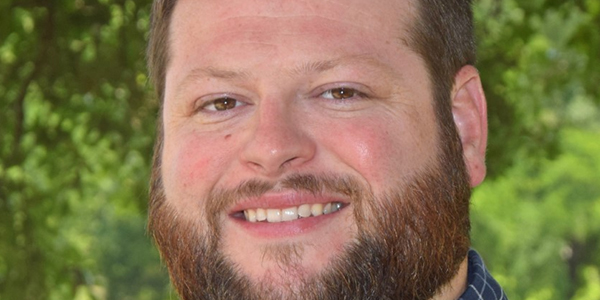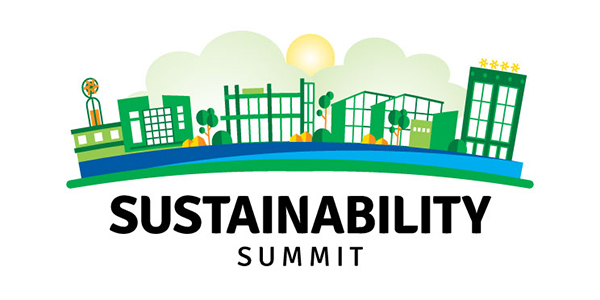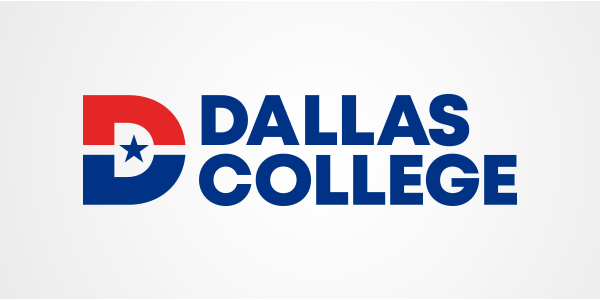The shift to Dallas College’s single accreditation not only brought with it a new, unified structure; it also ushered in the need for a new brand identity.
So, when plans took shape about a year ago to become Dallas College, which would effectively merge seven colleges into one, the college’s Office of Marketing and Communications undertook the tall task of creating a new institutional identity by first asking questions.
Find out how DCCCD became Dallas College.

Meet Dallas College’s New Energy Manager: Garrett Rosser
Before Dallas County Community College District became Dallas College, Garrett Rosser worked at North Lake College as the associate director of energy management services. His impressive track record of reductions – 17.8% in annual energy expenditures, 15.3% in total energy consumption and 15.5% in carbon emissions – was a key factor in his selection for Dallas College’s new energy manager position in April.
Garrett joined Dallas College/DCCCD in November 2017. For six years prior to that, Garrett was building automation and energy management consultant for Ideal Impact Inc., an energy savings company based in Grapevine, Texas. While at Ideal, he developed energy conservation projects for more than 200 partner organizations.
- What are some of your short- and long-term goals for improving energy efficiency at Dallas College?
- The most pressing need in the very short term is to be good stewards of our resources during times of reduced occupancy during the COVID-19 response, turning off as much as possible while maintaining our buildings for safe occupancy. 4CP Demand response is a major effort for the summer months, generating savings and contributing to the reliability of electric delivery in the state. We have worked at each campus to develop a 4CP Action Plan that is implemented on peak load days to drive demand reductions in a coordinated Dallas College effort.
- Longer-term goals include creating a culture of energy awareness, especially among key facilities staff; development of a comprehensive Energy Management Master Plan that will guide operational best practices for Dallas College; and establishing Dallas College as a leader in energy stewardship among higher education organizations.
- How did you become interested in energy management?
- During a career transition, I was connected with an energy services company here in the DFW area that demonstrates a true stewardship mindset; this was in-line with my personal desire to have a positive impact in the world and do the most good with the resources that we have.
- If someone wanted to start a new career in energy management, what skills, knowledge, and personality traits would be helpful?
- Effective energy management requires a person to be connected to the mission of the organization and ensure that it is met without interruption. The individual must form strong relationships across the organization, built on respect and trust. The individual must be an advocate for others and help achieve common goals. They must be analytical in nature, seeking to make connections and draw conclusions about systems rather than individual components. They must be willing to have honest conversations about areas where the organization or individuals can take advantage of an improvement opportunity, and do so tactfully. They must have a core knowledge of electrical and mechanical systems within commercial buildings. They must always be seeking out new knowledge of industry trends and technologies and evaluate them as potential tools for supporting energy management efforts.
- What advice do you have for other businesses that are thinking about starting an energy efficiency program?
- It is always a good time to save energy and money! I would encourage organizations to be aggressive in their goal setting. Be diligent about choosing partners that are trustworthy, open, and honest. Energy savings can be technical in nature, and industry partners can be extremely valuable. However, there are many firms that take advantage of an organization’s lack of expertise and are not transparent about their practices, or withhold information that could be extremely valuable for allowing a client to have long-term success after the end of a service agreement.

Sustainable U Webinar: Oh the Veggies You’ll Grow! What To Plant Now in Dallas
- Tuesday, July 14
- Noon to 1 p.m. Online
- Dr. Kara Casy, Director of Urban Agriculture at El Centro Campus, and Darciea Houston, nutrition and wellness consultant
Looking to improve your health while growing fruits and vegetables? We can show you how to garden in your window, on your porch or balcony, or in your backyard.
Join us for tips on growing your own healthy fruits and vegetables at home, on a budget! Whether you’re a beginner or a seasoned gardener, with a little inspiration you’ll be well on your way to improving your health, while saving money.
There is no charge for this event, but you must register in advance.
Upcoming webinar on July 29: How to Talk to the “Other” Side

Call for Presentations
Share your knowledge at the 2020 Virtual Sustainability Summit Friday, Nov. 6
The 10th Annual Sustainability Summit, presented by Dallas College Mountain View Campus, will be held virtually on Friday, Nov. 6.
Theme
Resilience for the next 50 years
Keynote
“In the pursuit of resiliency: sustainability and social justice for all”
By Charles Hopkins, UNESCO Chair in Reorienting Education Toward Sustainability
Breakout Session Tracks
- Facilities Management
- Resilience: Adapting and Thriving After a Crisis
- Resource and Energy Efficiency in Your Home
- Sustainability in Your Business
- Teaching Sustainability
Details
- Sessions are 50 minutes. (35 minutes for presentation, 15 minutes for Q&A)
- All presentations will be virtual via WebEx.
- If your presentation is selected, you will receive detailed information on computer/video/audio requirements.
- Email notifications will be sent in mid-August.
If you have any questions, please contact Lori Delacruz Lewis at LDelacruz@dcccd.edu.
Deadline for submissions is July 24.
Submit Your Proposal
Sustainability Tip: Oncor Helps Customers Save Energy and Money Through State-Mandated Programs
Did you know that Oncor Electric Delivery serves most of Dallas County and offers residential energy efficiency incentive programs? The programs, which were mandated by the Texas legislature, started in 2002. They are funded by a small monthly fee built into the wholesale electric rate of customers throughout the state.
- The Home Energy Efficiency program applies for insulation, heating and cooling upgrades.
- The Low-Income Weatherization incentive is for home insulation improvements.
- The Solar Photovoltaic Residential incentive helps homeowners deploy solar panels and their associated components at a reduced cost.
- The Oncor Retail Products Program offers discounts at the point of sale when homeowners purchase LED products with ENERGY STAR labels.
Visit takealoadofftexas.com and get rewarded for reducing your energy bills.

Sustainable Development Goal #12 – Ensure Sustainable Consumption and Production Patterns
Sustainable consumption and production is about promoting resource and energy efficiency, sustainable infrastructure, and providing access to basic services, green and decent jobs and a better quality of life for all. Urgent action is needed to ensure that current material needs do not lead to the over extraction of resources or to the degradation of environmental resources, and should include policies that improve resource efficiency, reduce waste and mainstream sustainability practices across all sectors of the economy.
At Dallas College, our seven campuses are committed to building and operating healthy, energy-efficient facilities that ensure that our students and employees feel well, think well, and perform well. We believe our college has a fiduciary responsibility to the taxpayers of Dallas County to ensure that all new buildings are economically feasible and support the college’s long-term financial health. Long-term, strategic thinking is rewarded; inefficient building designs that waste energy and generate pollution are discouraged and all new construction is incentivized to meet net-zero energy standards. When existing buildings are upgraded or renovated, they also will be incentivized to meet net-zero standards.
Discover even more ways Dallas College and Dallas County are supporting SDG #12 through our special video series.

Join us in taking the Renew Texas 2025 pledge to use electricity generated from 100% renewable energy by 2025.
